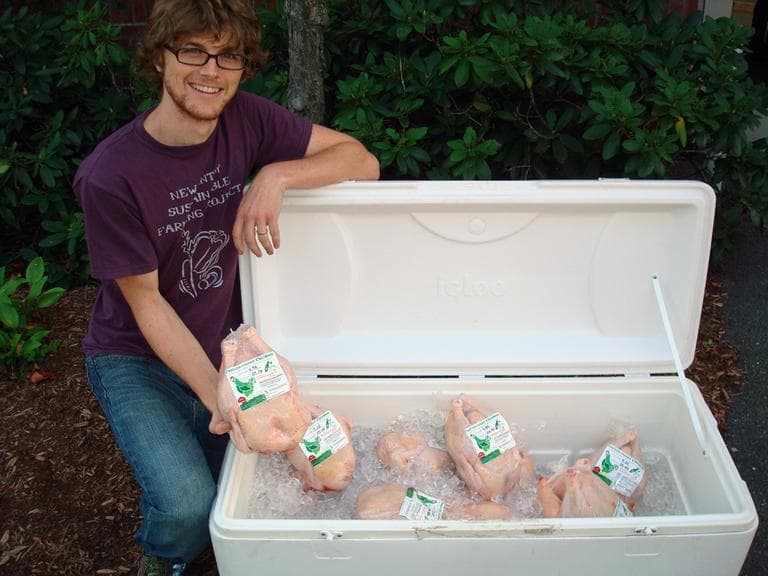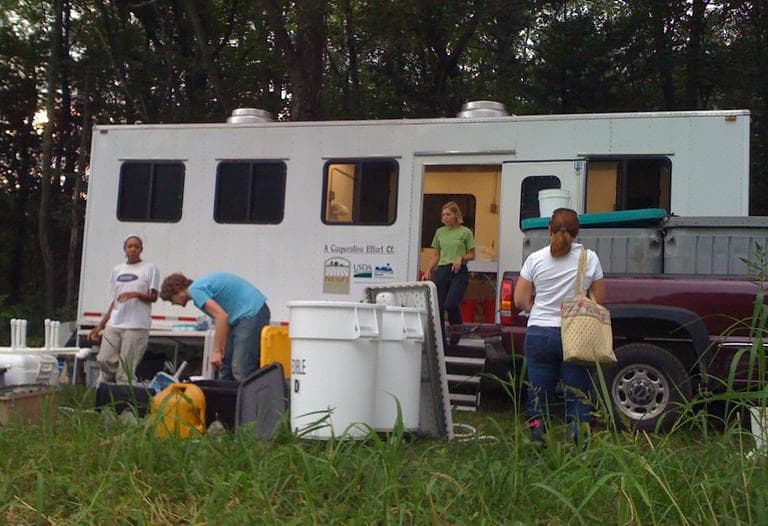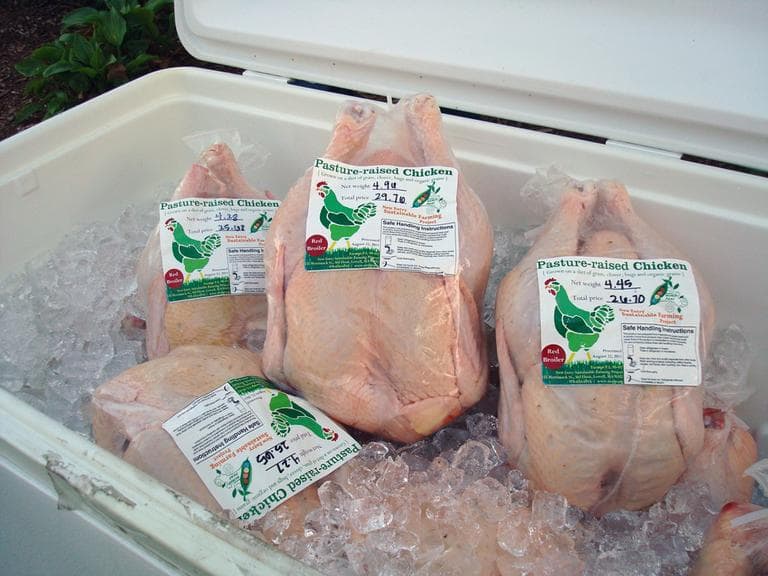Advertisement
Mobile Slaughterhouse Keeps Local Farmers Moving
Resume
It may seem like summer has slipped away in Boston, but we still have many more weeks of farm stands and farmers markets to look forward to.
The demand for locally grown food has skyrocketed in recent years, but there's one area where Massachusetts farmers have had trouble satisfying demand: meat. Livestock farming has a lot more start-up costs and regulatory hurdles associated with it than farming vegetables.
Take chickens — they're actually quite easy to grow, but meat animals destined for the consumer market have to be slaughtered in USDA-approved processing facilities. There is, currently, no legal chicken processing facility available to small-scale farmers in Massachusetts.
But advocates for alternative agriculture say they've figured out a way around that problem.
A Slaughterhouse On Wheels
It used to be simple. Farmer grows chicken, farmer kills chicken, consumer buys chicken, everybody eats and repeats.
But with the rise of factory livestock farming about 30 years ago, government regulation of the meat industry stepped up accordingly. That's also about the time that New England's chicken industry moved south to places like Alabama and Missouri, where Tyson and Perdue lord over huge poultry factories policed by armies of USDA inspectors.
Today, we have no such thing up north. What we do have are people like Jennifer Hashley.
"After college, I started learning more and more about where our food comes from and got a little disturbed by that, so I stopped eating meat for a long time," Hashley said.

Hashley did a tour in the Peace Corps working with farmers in Honduras. She came back and attended an organic farming program at the University of California Santa Cruz. Now she and her husband raise chickens, pigs, sheep and rabbits on a small farm in Concord. She eats them all, by the way. And she also directs Tufts University's New Entry Sustainable Farming Project, a program that's basically helping a new generation of independent farmers relearn what they'd done for millennia.
"It's great to be able to give back," Hashley said. "I mean, my vision would be to see many many more small-scale farmers scattered across the landscape. I think it's good food security for our communities."
Hashley used to take her birds to a small poultry operation in Boston's Chinatown, but that got shut down. Now, the closest USDA-approved poultry processing facility is in northern Vermont. Large farms can build their own processing facility for about $1 million — not an option for people like Hashley.
The solution, Hashley says, is the thing she's busy setting up. The Mobile Poultry Processing Unit, or MPPU. Literally, it's a slaughterhouse on wheels.
"This is a great alternative because it's shared infrastructure," Hashley said. "It moves from farm to farm, not every farm has to build their entire processing facility."
The MPPU is a grant-funded joint project between Hashley's organization at Tufts and the New England Small Farm Institute in Belchertown. And there's actually two of them. The first one, built on a flatbed trailer, serves western Massachusetts. The newer model, which made its debut this summer, serves eastern Massachusetts and looks kind of like a small mobile home.
Farmers get certified on the unit and then they hook it up to a truck, drive it to their farm, do their dirty work and drive it back — all for a base rate of $175 a day.
Feeding A Hungry Market
The Smith Farm in Dracut is a training site for the New Entry Sustainable Farming Project. Small-scale farmers-to-be work on the farm growing organic corn, tomatoes, greens and some beautiful chickens.
"We raise them here and we move them every day on fresh pasture," Hashley said.
The chickens usually cluck peacefully around the farm yard. Being raised for meat, though, their days are numbered.
You've probably already figured out this story is not going to end well for the little guys. But if you eat chicken, bear in mind that they have basically the best last day a meat chicken could hope for.
On what's called the "dirty side" of the MPPU, Sam Anderson slipped on some serious-looking heavy rubber gloves. He's the livestock coordinator with the New Entry project. Twenty-something, slender, with hipster glasses, he looks like he should be working with PETA. But he is not.

He suspended a chicken upside down in a cone and cut its throat with a knife that simultaneously delivers an electric stun.
The birds twitch violently for a couple minutes after they're dead. Once they bled out, Anderson transferred the carcasses to a vat of hot water called "the scalder."
"They rotate around in there and the feathers come off," Anderson said. "Then they go into the plucker."
Part of the advantage of slaughtering birds on a small scale, one by one, with your own hands, is that you can make sure the chicken is actually dead. That doesn't always happen in factory slaughterhouses. And you don't want to be alive when you go into the scalder or the plucker.
Over on the so-called "clean side" of the unit, half a dozen volunteers are waiting to help gut and package the birds. The New Entry program sells their wares on the Tufts campus and they sent out an email asking if any of their customers wanted to come help out and learn where their meat comes from.
Tufts grad student Eva Agudelo figured she was game, but standing next to the mobile unit with a knife and a large pair of tweezers, she looked slightly traumatized.
"I am currently removing the feathers from around the anus of the chicken and I'm gonna cut into its neck area and try to get out the top part of the stomach and intestines," Agudelo narrated. "It's still really warm ... It's really gross."
More than 100 Massachusetts farmers have gotten trained on the Mobile Poultry Processing Unit, though right now, only four farms are active users. It's really more of a demonstration project, to show small-scale farmers how they might pool their resources and start producing more locally raised, humanely killed meat, without the prohibitive start-up costs.
If the New Entry program offers any indication, there's a hungry market out there.
On the Tufts campus in Medford, Anderson, the knife-wielding hipster, delivered his birds to a grateful public. He sells Cornish Cross chickens for $5.75 a pound and Red Cross chickens for $6 a pound.
Now, $6 a pound is lot more than the buck or two a pound you might pay at the grocery store. Despite the cost, Ethan Barron, the men's track coach at Tufts, is a repeat customer.
"I got $80 on me, so that's going to limit my choices," Barron said. "The infant son is in the car, so even though I don't make a lot of money, I will gladly fork over more money for higher quality food knowing that he's gonna get the best."
More:
This segment aired on September 12, 2011.